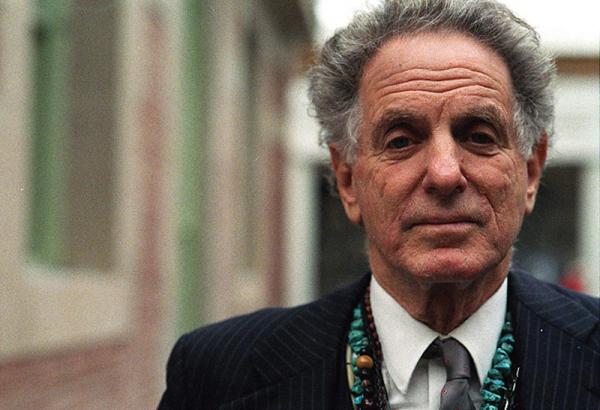REDISCOVER: David Amram

November 15, 2016
Taking What's Available and Making Something Beautiful
David Amram is a singular force in the music world. In addition to being appointed the first composer-in-residence at the New York Philharmonic by Leonard Bernstein, he has played with such jazz greats as Thelonious Monk, Charles Mingus, and Dizzy Gillespie, collaborated with beat-generation icons like Jack Kerouac and Allen Ginsburg, and scored such films as The Manchurian Candidate and Splendor in the Grass. He has also authored four books, advocated for progressive causes, and been the subject of a recent documentary film.
The composer, who celebrates his 86th birthday this week, maintains an active performance schedule, often collaborating with and mentoring young musicians in the process. Steeped in jazz, classical, and Jewish musical traditions virtually from birth, Amram is one of America’s best talents, a true Renaissance man whose life and work has been defined by constantly broadening horizons—culturally, personally, artistically. In constantly seeking to learn from others, he has approached foreign traditions with respect and humility.
Though he maintains that Jewishness informs his overall artistic approach, Amram has also composed several pieces with distinctly Jewish connections, three of which are featured on the 2004 Milken Archive album bearing his name.
 David Amram and Leonard Bernstein. 1967. Bernstein appointed Amram as the first composer-in-residence at the New York Philharmonic.
David Amram and Leonard Bernstein. 1967. Bernstein appointed Amram as the first composer-in-residence at the New York Philharmonic.
Of the three, Songs of Soul: Shirei n’shama most reflects his long-standing interest in diverse musical traditions. “I wanted to do a piece that reflected the polycultural nature of the Jewish people as a nomadic people,” he said of the work at the time. Its three movements encompass Beta Israel (Ethiopian Jewry) chant, Hassidic nigunnim, eastern European liturgical and folk music, Ladino folk song, and Yemenite Jewish music.
DON'T MISS A BEAT
Get the latest updates from the Milken Archive, including articles, giveaways, and an upcoming interview with David Amram!
Shir L’erev Shabbat is Amram’s major venture into the realm of sacred Jewish music. In this, Amram stands alongside a legion of major American and émigré composers who were commissioned by Cantor David Putterman to write liturgical settings and complete services for the Park Avenue Synagogue. Amram and Putterman first met in the summer of 1957 at a “Shakespeare in the Park” production in Central Park, for which Amram had written the incidental music—his first of many collaborations with Joseph Papp. He described the experience of writing the service as a delayed bar mitzvah, stating: “I gained a new part of my Jewish manhood—at thirty rather than thirteen.” (Amram did not have a traditional bar mitzvah due to his father being in military service during the war.) The work is composed for cantor, chorus, and organ, and combines tonal and nontonal elements in unconventional yet effective ways.
The album closes with three excerpts from Amram’s opera, The Final Ingredient. Set in the Bergen-Belsen concentration camp, the plot concerns a group of inmates determined to hold a Passover seder, and who must fashion the required ingredients from what is available to them within the camp. There is an egg in a bird’s nest just outside the camp fence, but the only inmate strong enough to scale it has lost his faith and refuses to participate. As the other inmates try to convince him otherwise, a series of discussions ensues in which the merits of faith are debated. “Every word of it is touching. It's very powerful,” said Kenneth Kiesler, who conducted the recording.
When describing his artistic approach, particularly in conjunction with the array of musical traditions he has sought out and learned, Amram linked it to Jewishness via an analogy with—what else—food:
If someone comes by the house and you have to give them a meal, you open up the ice box, so if there’s marmalade and mayonnaise and English muffin, an ear of corn, and some other leftovers, and a few eggs, you figure out the all-time, one-and-only, super-klezmer-type omelet. And that, in turn, is the perfect recipe, because you’re taking what is available and making something beautiful out of it.
On December 18th Amram will be honored by Moment Magazine with their annual Creativity Award. Listen to the full interview and explore Amram's recordings, videos, and photos.
Listen to the Interview » View Artist Profile » Explore the Album »
